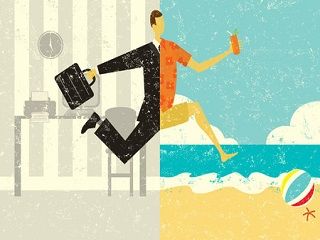Vacations: A ticket to creativity?
| Datum: | 23 mei 2018 |

According to a press release of the U.S. Travel association, two out of three American executives believe that vacationing improves creativity at work. The ability to “think outside the box”, to produce novel, original and useful problem solutions is vital to drive civilizations forward and adapt to change (Hennessy & Amabile, 2010).
In recent years, several studies have demonstrated that people who have lived abroad show higher levels of creativity. For instance, William Maddux and Adam Galinsky conducted several experiments in their lab during which students had to work on creativity tasks such as the Dunker candle problem, negotiation and drawing tasks or the Remote Associates Test. They found that students who had lived abroad and adapted to a foreign culture solved the tasks more creatively than students who lacked this international experience. But can considerably shorter periods abroad also improve creativity?
To answer this question of potential short vacation effects and to also address the problem of reversed causality in earlier studies (that is: it's the creative students who go abroad rather than a stay abroad making them more creative), we set up a longitudinal field study. In this study, we examined creativity with the help of an idea generation task performed by 46 Dutch workers before and after a three-week summer holiday. Each generated idea was blindly rated by three trained raters independently for originality (i.e., degree to which an idea is uncommon, remote and clever). Diversity was assessed by counting the number of categories of ideas produced by each participant. Not surprisingly, we found that the ideas after the holiday were as original as before. A trip to Cuba does obviously not make you a Hemingway. However, it also turned out that the range of ideas produced by each person was more diverse after vacation, indicating higher levels of mental flexibility. This means, after returning home from a vacation, workers are slightly more likely to consider different aspects of a problem and avoid reliance on conventional ideas and routine solutions.
It is not yet clear what the underlying mechanisms for this type of change are. A prime suspect is removal from work strain. Job stressors such as time pressure, cognitive or emotional demands deplete people´s psychophysiological resources by demanding constant attention. Stressed people will more likely display routinized, well-rehearsed behavior patterns, because their attention and effort are focused on salient job stressors. In this situation, creative ideas are less likely to come to awareness.
This suggests that moments free of job stress are important for human functioning. Earlier studies have demonstrated that well-recovered workers are more likely to “walk the extra mile” for their employer, help their colleagues or take on additional work tasks (e.g., Binnewies, Sonnentag, & Mojza, 2010). Our study has shown that vacations may also help working people to come up with more diverse ideas. Accordingly, regular, uninterrupted moments to recover from demanding jobs are essential for both employee’ well-being and performance. Employers and employees could jointly agree on measures which support psychological disengagement from work during their free time to make sure that vacationing does not merely mean staring at your work emails in exotic locations.
An earlier and adapted version of this text appeared in “The Psychologist”
Dr. Jessica de Bloom (j.de.bloom rug.nl) Rosalind Franklin Fellow, HRM & Organizational Behavior, Faculty of Economics and Business, University of Groningen.
References
- Binnewies, C., Sonnentag, S., & Mojza, E. J. (2010). Recovery during the weekend and fluctuations in weekly job performance: A week‐level study examining intra‐individual relationships. Journal of Occupational and Organizational Psychology, 83(2), 419-441.
- De Bloom, J. (2012). De kunst van het vakantievieren [The art of celebrating vacations]. Amsterdam, Netherlands: Boom.
- De Bloom, J. (2015). Making holidays work. The Psychologist, 28(8), 632-636.
- De Bloom, J., Ritter, S., Kühnel, J., Reinders, J., & Geurts, S. (2014). Vacation from work: A ‘ticket to creativity’? The effects of recreational travel on cognitive flexibility and originality. Tourism Management, 44, 164-171. (www.sciencedirect.com/science/article/pii/S0261517714000685)
- Hennessy, B. A., & Amabile, T.M. (2010). Annual Review of Psychology, 61, 569-598.
- Leung, AK-Y, Maddux, W.W., Galinsky, A. D. & Chiu, C.-Y. (2008). Multicultural experience enhances creativity: The when and how. American Psychologist, 63, 169-181.
- Maddux, W. W., & Galinsky, A. D. (2009). Cultural borders and mental barriers: The relationship between living abroad and creativity. Journal of Personality and Social Psychology, 96, 1047-1061.


